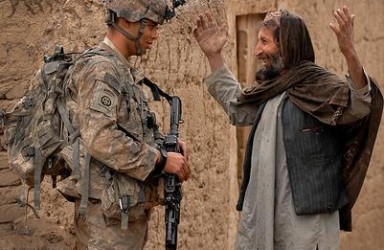The War on Terror and the Rise of Neo-Orientalism in the 21st Century
There is a growing critique of the hegemonic discourse on the ‘War on Terror’ against the backdrop of an overwhelming silence about the impacts of the global WOT on the non-Western and particularly the Muslim world. The new critique is based on: the dominance of ‘state-centric’ perspectives; the pre-eminence of ‘problem-solving’ approaches; and largely ahistorical accounts of terrorism.
Comic book sensibility
Just over a year ago, Obama’s climate negotiator Todd Stern gave an important speech at a U.S. Climate Action Symposium. He’d been on the job for fewer than three weeks, but he nonetheless offered 10 fairly detailed principles that he said would underpin U.S. participation in the Copenhagen process.
The Thorny Triangle: Cyber Conflict, Business and the Sino-American relationship in the Global System
The China-Google cyberconflict adds to the debate on the position of China in the world system, & creates insecurities about the ambitions, capabilities and hidden desires of the ‘next hegemon’. It brings together in one discussion a complex matrix of debates: global politics and world-system theorizing, global political economy and many more.
Capitalism and the Useful Nation State
Not so long ago, it was fashionable among apologists and many other commentators on contemporary capitalism to refer to the nation state as passé. Globalization of large corporations was enshrined as a mechanism enhancing efficiency far beyond what could be achieved within national boundaries. Not surprisingly these rosy assessments of capitalism’s prospects glossed over the problem of its inherent instability.
Threat Morphing in Cyberspace
Much has been written about cybercrime, cyberterrorism and cyberwarfare, but very little has been written about how, and why, these evolving threat categories differ from their real-world analogues. This is unfortunate, because the differences between the threat categories mean that the laws and strategies devised to deal with real-world threats are often ineffectual in dealing with cyber-mediated threats.
In Defence of Dialogue of Civilizations
Warnings against the political construction of the Self through opposition to a negative-valued, dangerous or threatening Other are common at a time when the discourses of the clash of civilisations have acquired a worryingly prominent place in the public spheres of many different countries. But do we actually need ‘more’ religious and cultural traditions rather than less in order to oppose religiously-inspired political violence?
Whither French Foreign Policy: same horns, same dilemma?
From the beginning of the twentieth century France’s foreign and defence policy has been impaled on the horns of a dilemma: whether to seek a European or a transatlantic solution to her security problems. Since coming to power in 2007 Nicolas Sarkozy appears to wish to embrace both routes in equal measure. If French history is anything to go by he may not be able to sustain that position for long.
The Globalization of Religious Advocacy in America
National religious lobbies and advocacy organizations represent a growing phenomenon of political life in America. One of the striking recent developments is the globalization of the focus, constituencies, and vision of this religious political advocacy. From the beginning of the republic, national religious interest groups have focused periodically on international relations.
Barack Obama’s Democracy Promotion after One Year
It is wrong to say that Barack Obama rejects the democracy tradition in American foreign policy. His record, appointments and first-year budget requests show that democratization is not being jettisoned as a US goal. To varying extents, the president and his foreign policy principals are liberal internationalists. However there has been a stark rhetorical break from the Bush era.
TIME TO WRAP UP NATO
It is getting boring. American officials make a stout plea for NATO assistance in some out of area effort, praising the alliance as vital to the security of the members and the globe. Meetings are held at which NATO officials underline the importance of the mission and its relevance to the alliance.







